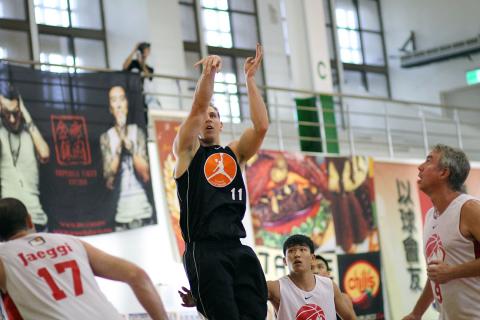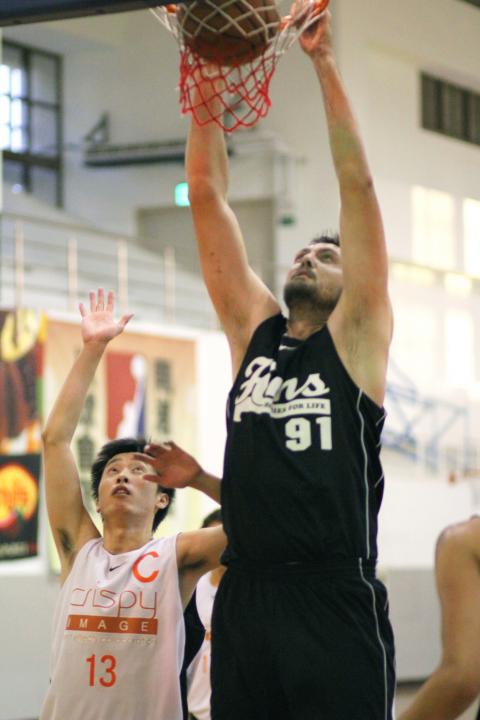When most athletes finish high school or college, it’s the end of the line for their sporting careers. Only a small percentage of the most gifted ones go on to become professionals in their field, while the others tend to take great pleasure in reminiscing about how good their glory days used to be. Sean Cheng (鄭鑫), co-founder and commissioner of the Glory Days Basketball (GDB) league, came up with the idea for a basketball league late one night two years ago.
“In my dream, I was David Stern of a league that was just like the NBA — but for the average Joe who still loves to play and play hard,” Cheng said.
“All athletes want to perform at the highest level and show the entire world that they can do it, or still do it. GDB is a place where people can relive that dream every weekend and share this experience with all of their friends and family.”

Photo courtesy of Glory Days Basketball
Cheng woke up and told his wife and co-founder, Jess Cheng, his idea, and they were off to the races.
“Our first game had two teams, two refs, two scorekeepers, one videographer, and one photographer in the upper gym of the Taipei American School,” Jess Cheng said.
“Today we have over 35 teams, over 20 staff members with games located in three different top-notch gyms in Taipei City.”

Photo courtesy of Glory Days Basketball
GDB’s rapid growth can be attributed to their weekly Facebook postings of pictures and highlight videos, their new non-profit status, working closely with the Ministry of Foreign Affairs and of course, Jeremy Lin (林書豪).
“Linsanity introduced an entirely new fan base to the game of basketball, young and old,” Jess Cheng said.
“Our players still play just as hard, but I think their love for basketball is appreciated by the general public 100-fold. This means that a lot more friends and family members show support, whether in person or on Facebook.”
This Sunday, GDB will be partnering with Nike to run a three-on-three tournament at the Ximending movie park basketball courts, and then have a two-game exhibition with the top four teams in the league. This means that two years of hard work is finally paying off for the Chengs.
“GDB is more than just a full time job for us now. It’s a part of who we are,” Jess Cheng said.
Sean Cheng added, “I think there’s a lot of people, not just in Taiwan, that want their glory days back and that’s why we are where we are today.”

Oct. 21 to Oct. 27 Sanbanqiao Cemetery (三板橋) was once reserved for prominent Japanese residents of Taipei, including former governor-general Motojiro Akashi, who died in Japan in 1919 but requested to be buried in Taiwan. Akashi may have reconsidered his decision if he had known that by the 1980s, his grave had been overrun by the city’s largest illegal settlement, which contained more than 1,000 households and a bustling market with around 170 stalls. Fans of Taiwan New Cinema would recognize the slum, as it was featured in several of director Wan Jen’s (萬仁) films about Taipei’s disadvantaged, including The Sandwich

“Wish You Luck is not just a culinary experience, it’s a continuation of our cultural tradition,” says James Vuong (王豪豐), owner of the Daan District (大安) Hong Kong diner. On every corner of Kowloon, diners pack shoulder-to-shoulder over strong brews of Hong-Kong-style milk tea, chowing down on French Toast and Cantonese noodles. Hong Kong’s ubiquitous diner-style teahouses, known as chachaanteng (茶餐廳), have been a cultural staple of the city since the 1950s. “They play an essential role in the daily lives of Hongkongers,” says Vuong. Wish You Luck (祝您行運) offers that same vibrant melting pot of culture and cuisine. In

Much noise has been made lately on X (Twitter), where posters both famed and not have contended that Taiwan is stupid for eliminating nuclear power, which, the comments imply, is necessary to provide the nation with power in the event of a blockade. This widely circulated claim, typically made by nuclear power proponents, is rank nonsense. In 2021, Ian Easton, an expert on Taiwan’s defenses and the plans of the People’s Liberation Army (PLA) to break them, discussed the targeting of nuclear power plants in wartime (“Ian Easton On Taiwan: Are Taiwan’s nuclear plants safe from Beijing?”, April 12, 2021). The

Artificial intelligence could help reduce some of the most contentious culture war divisions through a mediation process, researchers say. Experts say a system that can create group statements that reflect majority and minority views is able to help people find common ground. Chris Summerfield, a co-author of the research from the University of Oxford, who worked at Google DeepMind at the time the study was conducted, said the AI tool could have multiple purposes. “What I would like to see it used for is to give political leaders ... a better sense of what people ... really think,” he said, noting surveys gave